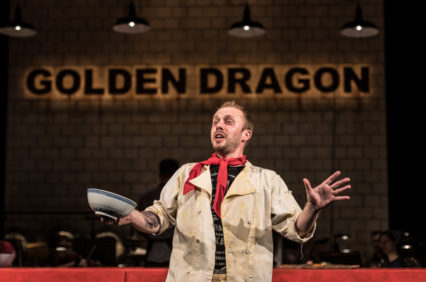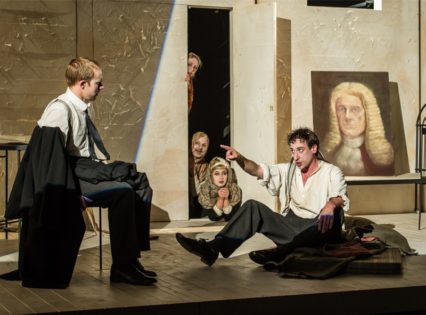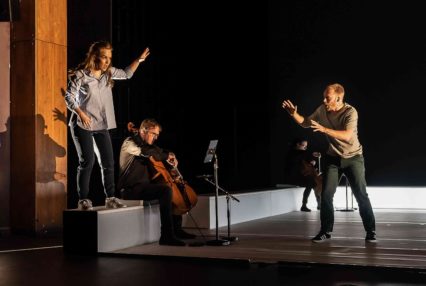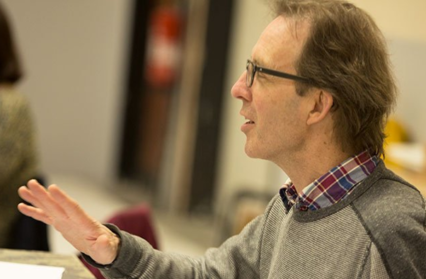Michael McCarthy, co-founder and artistic director of Music Theatre Wales, discusses the future of contemporary opera with Linda Christmas.
For thirty years, Music Theatre Wales (MTW) has delighted devotees of contemporary opera with new works. Their output has included the first contemporary opera in Welsh, Y Twr, as well as both new works from unknown British and European composers and little-known works from famous composers. Their award-winning hits have included the European premiere of Philip Glass’ The Fall of the House of Usher; Mark Anthony Turnage’s Greek and most recently Philip Venables’ Denis and Katya.
Their next opera, Violet, (Tom Coult and Alice Birch) has been in the pipeline for some time, but will not emerge until June 2022. It will also be their last. There are serious funding problems facing MTW: Arts Council Wales remains loyal but Arts Council England (ACE) has closed its cheque book, depriving the company of around £100,000 a year. That nips about a third off the MTW income, pushing the company to reduce overheads and change direction.
The future will be digital and demonstrate a more progressive outlook, with a focus on societal inclusivity.
The importance of such inclusivity was first brought to the attention of MTW some three years ago. The Golden Dragon, an on-trend tale about illegal immigrants in an uncaring, unnamed country, garnered 4-star reviews; however, the Hackney Empire, one of the touring venues, spotted that the opera featured Chinese immigrants in a Chinese restaurant and yet no one in charge of the production had consulted a Chinese Designer. Moreover, there were no Chinese or Asian singers. The Hackney Empire denied The Golden Dragon access to the theatre. At first, this seemed passingly reactionary, but then the media piled in. Michael McCarthy, co-founder and artistic director of MTW, apologised. He seemed – and still seems – genuinely chastened.

“The opera and the play it is based on are offensive in the way they present racial stereotypes,” McCarthy says. “We did not spot this and were therefore guilty of the same. I have to be honest and say it took a while for us to start understanding what the problem was and how we were guilty, because we believed we had avoided racial stereotyping in the performances. The issue was much bigger and deeper than that, and our lack of understanding of how this piece would appear to non-white and especially Chinese audiences revealed a great deal. I now understand why the term ‘lived experience’ is so relevant”.
Now, Elayce Ismail has been appointed Artistic Associate of a programme aptly named ‘New Directions’. The programme aims to engage with groups who are currently under-represented in opera, including Black, Asian and ethnically diverse artists, disabled artists, LGBTQ+ artists, and those for whom opera has historically been a no-go area.
‘New Directions’ will include three commissions to create a new digital work to be presented before the end of August 2021. Each team will comprise a composer working with either a writer, theatre maker, digital artist or other creative.
Was a lack of minority involvement behind the ACE decision to axe the significant grant?
Michael McCarthy: ACE made it clear that we were no longer viable because we weren’t developing our audience. Our figures were static and our core audience was white and middle class. We had a most loyal audience at the Royal Opera House and Buxton, but visiting so many other cities for just one night a year, with an opera that no one would know – because that was our mission – meant that there was no way we could get a bigger audience.
We tried. We had taken on a part-time marketing officer, spent money on a marketing consultation, started using social media and developed our website. We did our best, but it wasn’t enough. And as for ACE’s other requirements – education and outreach programmes – we couldn’t begin; while we were concentrating on stage productions, there was no more wiggle-room.
Finally, we had to admit that our touring-model had become counter- productive; we were spreading ourselves around and not developing a relationship with local theatres and local people. To do that, we needed to create an extensive on-going programme in every place we went.
MTW was never going to create its own momentum, unless we had been much larger, had permanent staff working on marketing and communication and had an outreach department, with a team of three or four staff members conducting projects throughout the year.

At one time you aimed to join forces with WNO. That sounded like a great idea. What happened?
Michael McCarthy: It looked like a win-win at first. I thought we could join with them and be housed in their office, and we were discussing that. That would have enabled us to severely reduce our overheads. We also hoped we could work with their production facilities and continue to create new works. They could run the engagement and education aspect that we couldn’t. They have an enormous department allocated to that.
In return then, WNO would get all-important new works and that would tick an Arts Council funding box for them! Why didn’t it work out?
McCarthy: I think the idea fell victim to COVID-19. With the enforced stand-still, WNO had the opportunity to take stock and rethink their own model. MTW and our kind of high-art new work did not fit in. They want to concentrate on community operas, the kind of thing that Glyndebourne and other companies do well. This embraces the local community and doesn’t have to tour.
So, inclusivity is the way forward?
Michael McCarthy: That’s the way it seems. We need to be more inclusive. We allowed ourselves to continue, as institutions and as society, to run our lives in a way that was quite aggressively exclusive. And yes, there is a guilt complex going across society, and a huge amount of learning going on. We are only scratching the surface at the moment.
Subconsciously, I have participated in that world. My ambition was to create the most exciting contemporary opera and share it. I didn’t think I was excluding anyone; anyone could buy a ticket. But I hadn’t thought about a whole group in Cardiff excluded from the Sherman Theatre. I didn’t think outside my own box. The Sherman was only too happy to sell seats, rather than ask, “where are the black and Asian faces?”. That’s very recent thinking.
I have been attending a UK-wide training programme about racism across the arts, and conversations have revealed many stories of overt and shocking behaviour and attitudes within artistic organisations – sometimes clearly conscious and calculated, and sometimes out of sheer ignorance.
Does this apply to the arts in Wales?
Michael McCarthy: The arts in Wales are no less guilty and there is a very long way to go to achieve genuine diversity, equity and inclusion.
My record is not disastrous but it could be better. I did present Jamaican composer Eleanor Alberga and Param Vir whose roots are Indian, but it’s not just about race and colour. The exciting thing now is to think about where opera might go and how it can become a radical, adventurous form. That’s what excited me thirty years ago and I want that experience again, but it is not going to come from the same old contemporary music circuit.
In order to get new ideas, in order to open new doors for opera, we need to reach out to new artists. I am excited by finding new voices from those who are already accomplished in what they do, but who never imagined they would talk about opera, let alone think about writing one. Working with Elayce, we have put together a list of 150 artists who we have not talked about in the world of opera who have real talent: composers, writers, digital makers and creative artists. We are listening and reading; it’s an intense process.

Are you angry at what is happening? Why can’t the big companies do all the education, out-reach and diversity programming and leave you to produce new works?
Michael McCarthy: In five years time I’d hope to be staging new work again, work that we never dreamed of. This is a reboot.
I am not angry. I can understand that publicly funded arts should have a responsibility to create work that the public will engage with and that we should not be satisfied with providing work for the same minority all the time. However, I do not believe this should exclude the creation of new and challenging work in whatever form it takes, which will be by definition less popular. I believe the public understands that innovative artists are also an important part of the richness and necessity of a decent society.
I honestly think there needs to be a balance and neither MTW nor ACE have got it quite right yet – MTW needs to reach out to a different audience and if ACE wants to see new opera thrive it needs to recognise that it needs more investment. I strongly believe that the arts councils should take a stronger overview and seek to balance what they support so that it covers the widest possible agenda, from challenging contemporary work through to community-based activity, and including a wider range of artistic expression that embraces all the communities that make up the UK.
There is a serious problem with opera funding – too much is going to established opera and not enough is going into the creation of new work. If we really want new work to reach new audiences, the whole system needs to be re-balanced. The fact that the resources are there and are not being used in the best possible way does make me upset!
The last few paragraphs neatly encapsulate the current state of contemporary opera. Reboot for MTW? Maybe. It won’t come from the tales of the Mabinogion, or the story of Caradoc or the collapse of coal mining in the Cynon Valley. The pendulum has swung and is heading for Butetown – or some such – in search of inspiration.
Linda Christmas has been an opera devotee for 50 years and has been supporting contemporary opera for ten years. To find out more about Music Theatre Wales, visit their website here.












